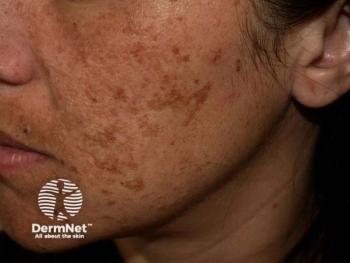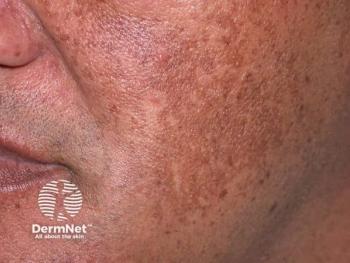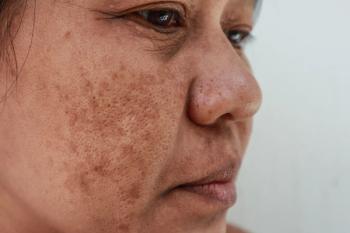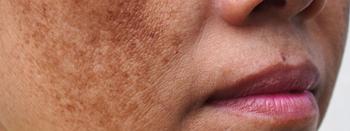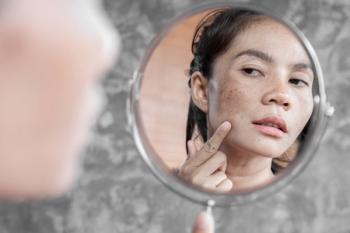
Herbal cream as effective as hydroquinone for melasma
Researchers examined a group of adult women diagnosed with melasma who applied a traditional medicinal product on one side of their face and 4% hydroquinone on the other side.
Facial melasma patients had about the same treatment outcomes whether they applied an herbal cream combining Cicer arietinum L. and Cucumis melo seeds or topical 4% hydroquinone, according to a research paper published in the Journal of Herbal Medicine.
Topical hydroquinone is a proven melasma treatment, but dermatologists often seek alternatives to hydroquinone because of the synthetic drug’s side effect profile, which includes post-inflammatory pigmentation. Another reason for the interest in herbal treatments for melasma is that melasma can be costly to treat and herbal remedies tend to be less expensive.
RELATED:
RELATED:
In this paper, Iranian researchers studied a combination of active ingredients that hadn’t been studied before in the treatment of melasma.
“The herbal medicine intervention used in this trial was a traditional medicinal product made up of a combination of extracts of C. aritinum L. (Leguminoceae; chickpea) and C. melo var. inodorus H.Jacq (Cucurbitaceae; melon seed). The product named Phytolight, is manufactured by a pharmaceutical expert in the laboratory of the Pharmacological Research Center of Medicinal Plants, Mashhad University of Medical Sciences, Mashhad, Iran,” they wrote.
The ingredients for making the cream were purchased from a local market, they wrote.
“The level of total phenolic compounds in the extract mixture of [Cicer arietinum L.] and [Cucumis melo seeds] was 16 mg gallic acid equivalent per gram of the extract mixture,” according to the paper.
Researchers analyzed results from 32 adult females diagnosed with melasma. They instructed the women to apply hydroquinone 4%, using 0.5 fingertip unit, on one side of the face and the prepared combined product, using 0.5 fingertip unit, on the other side, each night for 12 weeks.
Researchers evaluated patients every four weeks by digital photography, and melasma and severity index (MASI) scores. The study, the authors explained, is triple blinded because the investigatory, patients and analyzer were blinded regarding treatment allocation.
They found both creams resulted in significant improvement in melasma. Patients’ MASI scores significantly improved regardless of the topical used. While the difference between the topicals was insignificant, there was a slight difference in favor or hydroquinone. The MASI score decreased from 24.59 at baseline to 5 at week 12 with hydroquinone treatment, versus from 24.84 at baseline to 7 at week 12 with the herbal combination cream.
Interestingly, both topicals had a steady effect, without recurrence at four weeks post-treatment, they reported.
Erythema was the most common side effect, occurring only with hydroquinone. Acne occurred in 3.1% of patients with both treatments; erythema, dryness and scaling occurred only with hydroquinone in 3.1% of cases.
Just over 50% of patients reported they were completely satisfied with the hydroquinone cream, versus a slightly higher 52.3% with the herbal combination cream. Ninety percent of patients were satisfied with results when researchers combined moderately and completely satisfied patients.
Based on their work, the researchers concluded the herbal combination product with C. arietinum L. and C. melo seed is an acceptable hydroquinone substitute for melasma treatment. But the small sample size is a study limitation, and more research should be done to confirm these results, according to the paper.
Disclosures: Mashhad University of Medical Sciences’ research committee funded the project. The authors reported no conflicts.
Reference:
Mahjour M, Banihashemi M, Rakhshandeh H et al.
Newsletter
Like what you’re reading? Subscribe to Dermatology Times for weekly updates on therapies, innovations, and real-world practice tips.

